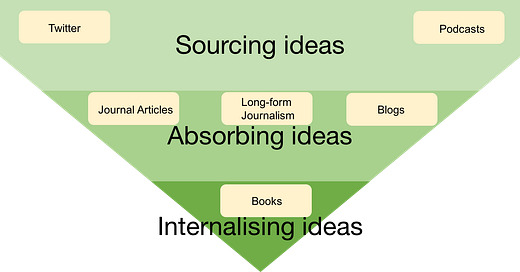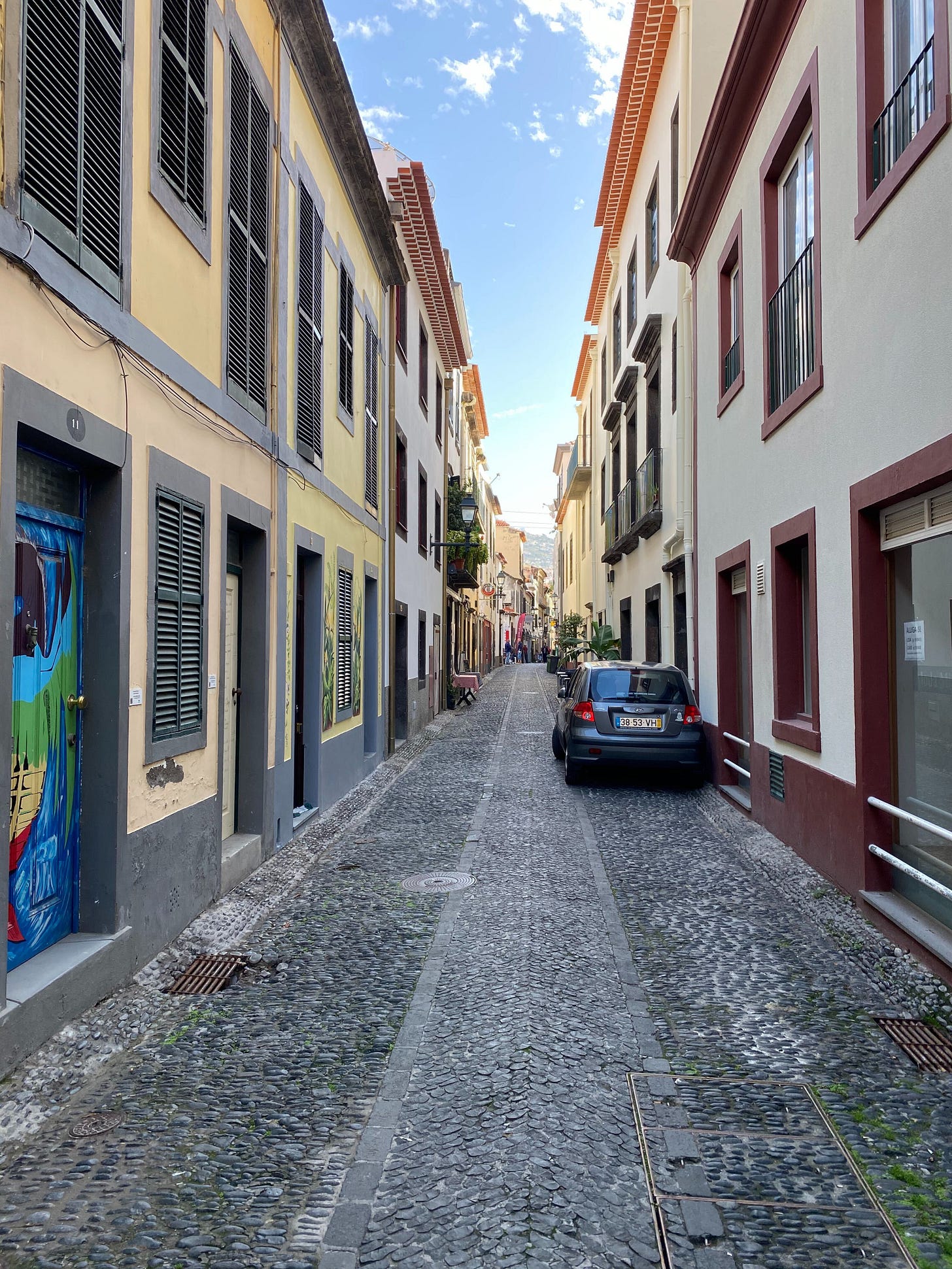#11: Internalising New Ideas
A reply to Slava; Find unconventional ideas from podcasts and twitter. Absorb them from papers, blog posts, and long-form journalism. Internalise them by reading books, then writing about them.
Welcome readers old and new. This is one of Thomas Hollands’ notes in his search for ideas which are surprisingly general, or generally surprising. You can find all past issues here.
How I read — A reply to Slava A
People love talking about themselves, and writers are no exception. They (we?) especially love writing about how and what they write about. Reading how others write is fun. But probably not very useful. You learn to write by writing, not by reading.
Far more useful is something written less often: Writing about how others read.
The best way to learn is through experience. But we only have so much life to spend making dumb mistakes. It is more useful to learn about all the worst mistakes and best insights others have gleaned, so we don't have to spend costly hours discovering them for ourselves. I prefer to learn from other people’s experiences, then fill in the gaps with my own experimentation.
People only write down the things they think are most important. And the written word is still the most information dense medium there is. It follows then, that the most reliable way to learn from others is to read what they've written. And by learning how others read, we can learn how to learn more reliably still.
Last week I read spakhm’s excellent piece breaking down the intentionality of his reading process. His reflections prompted me to write my own. Because I'm an insecure overachiever I'll go a step further than Slava did, and spell out my entire media consumption process. So here it is.
An aside — Why I read
People read for different reasons, and it's worth clarifying mine. I read to get better ideas, to answer my burning questions, and to revel in the pleasure of a well written story.
My media funnel
There are lots of good metaphors for how one consumes information. Idea supply chains. Barbell strategies. Perhaps because I have startups on the brain, I prefer to use the model of a funnel. You can break down the media I consume into three broad categories: media for sourcing ideas, media for absorbing ideas, and finally media for internalising ideas.
First, I source ideas. I used to do this generically. The people with the most boring music taste only listen to the top-40, and are happy playing "whatever's on". I used to find ideas from mainstream publications and select books based on bestseller lists, reading "whatever's good". But generic sources lead to generic books, and if you read those long enough you become a generic person. Now I have a more homespun, though hardly unique, approach.
Today I come across new ideas by listening to podcasts or scrolling Twitter. I listen to between 1 and 2 hours of podcast per day, always on 1x speed. I have a rolling subscription to about 20 podcasts so there's something new every day. I skip around a lot. At my auditory buffet I try to sample as much meat as possible.
Following prolific people on twitter is a good way to find unconventional ideas. Most often these arrive in my feed as twitter threads or links to blog posts. When these tickle me, I explore further.
Good ideas raise new questions, which, if you're like me, must be answered as soon as possible. I answer these questions by reading blog posts (like these ones), long-form journalism (comme ca) or technical papers (so was).
When I have a question I follow my nose and the local landmarks in idea space I understand, hopefully finding my way to another nutritious idea, another perspective which helps me get my bearings. The best ideas then suggest new questions: new trails to pursue, new territory to map out.
Occasionally I come across ideas so tantalising that I must read the whole damn book immediately (The Righteous Mind, Kill All Normies). More commonly, a twitter thread will lead to an Atlantic Article, which will lead to a Youtube or podcast interview. Very often the search will stop here. Most of idea space is not fertile enough to merit thorough exploration. Infrequently, though, I discover territory which is so prosperous it inspires not only exploration but colonisation. Ideas so good you want to plant your flag in them and claim them for your own.
These ideas change the way I see the world. Most often, they come from one thinker in particular, whose materials I then devour. Two years ago this was Riva Tez, whose boundless optimism and views on social media convinced me to start writing online. She has given few public interviews, and I must have listened to her excellent podcast on Problems Sighted over five times. Before her, it was David Krakauer, the head of the Santa Fe Institute. More recently, it was Vinay Gupta, whose unapologetically apocalyptic analysis of climate risk made me take climate change seriously again. Before him, it was the epistemology of Karl Popper, which crystallised the bedrock upon which I build my ramshackle models of the world.
When I get obsessed with someone in this slightly unhealthy way, I tend to read most things they've written, and most things other people have written about them. I use their thinking as a semi-permanent lodging, while I tour the local neighbourhood of ideas.
Though I rarely read the daily news, my reading habits are sometimes heavily shaped by it. When an unexpected news event happens, like coronavirus or Trump's election, I am sometimes compelled to drop everything and understand why. Trump and Brexit propelled me down the rabbithole of greek political thought and postmodernism. Covid led me to learn about K-factor, stochastic epidemiology, and home-brewed modelling of my own.
My reading is more reactive than proactive. I understand very little about the world: it surprises me almost every day. I try and use the momentum from these surprises, following my curiosity while its still fresh to lead me to ideas I've never before considered. If learning isn't fun, why do it at all?
To fiction or not to fiction?
I read more fiction than non-fiction because I'm lazy, and most non-fiction is as dry as the paper on which it's printed. I find fiction much better for absorbing norms and attitudes, while nonfiction is probably better for answering direct questions. I feel I remember more per page of fiction too, though most learnings from fiction are scattered facts, not unbroken chains of logic. Engaging with Conjectures and Refutations or More is Different makes one's head hurt more than the delightful narrative of Seveneaves or Master and Margarita. But you probably do learn more about how the world works.
I am a bit of a book completist because they are expensive and I am poor relative to the total number of books I want to buy. I know the best way to read books is to only pick up the ones you find interesting, but on any given day I am interested in so many things it is impossible for me to own all the books to sate my curiosity. If I ever attain riches like Croesus I'll build a library like Alexander. If not, I'll have to run a bookshop instead.
I rarely re-read books, because I am too busy building my world-models from scratch. I've read both Brave New World and Zero to One three times: they provide a platform for further thinking to build on. When I have a better sense of how the world works, I'll spend more effort repairing or robustifying my thinking instead of preparing foundations. At that point, I imagine I'll reread more often.
Notes or nah?
Though I spend much energy gathering information, I spend relatively little writing it down. I'm not a "productivity" nerd like some of you reading this. Instead of utilitarian I'm kind of sentimental — I'd rather revel in the pleasure of a good story than record my revelations in real time. This might be misguided. When I come across notes I've written, I often feel grateful for my former self. It stands to reason the more I record and reread, the more gratitude I'll feel.
But I do write some things. If I'm reading to answer a specific question (how to learn data science, how to write better ad copy) I'll take detailed notes. For everything else, I read pen in hand, ready to underline any resonant phrases or write jokes to myself in the margin. Whenever I finish a book I open a Notion doc and brain dump a summary, plus the main takeaways and personal learnings I've found. Synthesising scraps of information like this helps me remember things. I usually review the book too — everything is more fun when you have an opinion on it.
Infrequently, I inflict these opinions on others.
The times they are a changin’
My reading habits change based on my free time and my temperament. When I have lots of free time, I have more time to buttress my world-models with new insights. So I read more nonfiction. When I'm swamped with work or life admin, I prefer the whimsy of a novel.
Today, I'm close enough to starting a new job that my mind is being sucked into a vocation-focused vortex. I find myself thinking more about how to learn skills (like copywriting, data analytics) that will help me knock work out of the park. I'd like to read more books along these lines anyway. Books that will help me do things instead of merely consider things.
I'd like to be more intentional about how I read. The suggestion that stood out the most from Slava's article was "Study X through Y". Ideally study big, useful Xs, through idiosyncratic Ys.
Future projects for me will include:
studying economic growth through society's increasing mastery of thermodynamics
and/or studying how to write through reading everything by John McPhee.
I don’t think I’ll ever have the discipline to read five books on a theme. But I hope to bend my attention into reading two or three.
And how about you, curious reader? How do you read?
Odds n ends
With high quality consumer goods, strong regional identity, and medieval mountainous plumbing, Madeira has several similarities to Switzerland. I might write an essay about this over the next few weeks.
My walk to morning coffee.





